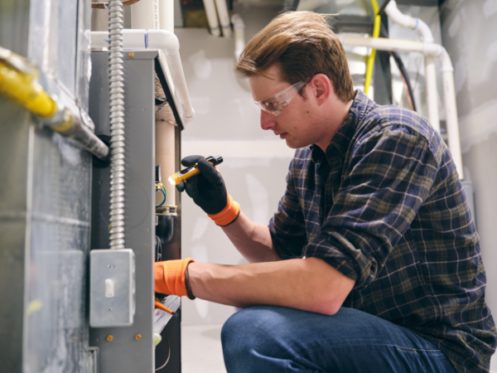As a homeowner, you understand the significance of controlling the temperature in your house, especially when you want to stay warm during the winter season. Many homeowners struggle to understand the difference between a furnace and a heat pump. While both systems help to warm up your indoor air, they differ when it comes to factors like energy efficiency, heating capabilities, cost, and use of space.
Keep reading to learn more of the differences between a furnace and heat pump and determine which system is better for your home in Washington, MO.
How Heat Pumps and Furnaces Work
Heat pump systems serve as energy-efficient alternatives to furnaces. Powered by electricity, a heat pump will transfer heat from a cool environment to a warm one.
During the cold winter months, a heat pump will take the heat from outside and supply it inside to warm up your home. When summer sets in, heat pumps transfer heat from the indoors to the outdoors, which helps to cool your space.
On the other hand, a furnace needs fuel or natural gas to generate electricity. Then, the furnace produces heat and blows it inside of your home using an electronic ignition or a pilot light.
You’ll find a burner that burns the natural gas and heat exchangers that transfer heat inside pf your furnace. Other features include a blower fan that helps with heat distribution inside of your house and an outlet letting out gaseous byproducts.
Cost
When comparing a heat pump and a furnace, you’ll want to know which heating system costs more. To help you decide, you’ll need to find out what your home is already equipped for.
For instance, your house might have direct access to natural gas, making a furnace a more affordable option. Otherwise, you’ll need to pay more when installing a furnace.
Energy Efficiency
Comparing the energy efficiency of a furnace to that of heat pump system isn’t always straightforward. A heat pump is often more energy-efficient since it can transfer more heat energy.
However, the complication occurs when high-efficiency heat pumps use less source energy in warmer climates than furnaces. In colder climates, most gas furnaces do much better than energy-efficient heat pumps.
Furthermore, you’ll encounter relatively lower natural gas costs than electricity. So, the lifelong operating cost of your heating system becomes a point of consideration.
Maintenance
Both heating systems will work for years and function more efficiently with routine maintenance. You’ll find air filters in your furnace and heat pump that you can easily replace.
Your heat pump will come fitted with indoor and outdoor units that your HVAC technician will recommend cleaning and inspecting yearly. Although your furnace doesn’t require an outdoor unit, it’s often combined with a central air conditioner unit.
It may help to consult with a technician about the proper maintenance schedule depending on the uniqueness of your heating system. Typically, furnace maintenance will cost less than a heat pump, so you may incur more maintenance costs for your heat pump in the long run.
Space Requirements
Most furnaces will need at least 30 inches of clearance to be installed inside of your house. Alternatively, heat pumps need about 24 inches of clearance, and they get installed outdoors.
If you choose a traditional air-source heat pump system, you’ll need to buy a fan coil and an indoor air handler unit. Regardless of what you want, you’ll find plenty of available options on the market.
Performance Ratings
How well your heat pump and furnace performs will vary depending on your area or residence. Keep in mind that furnaces generate heat, while heat pumps only transfer heat from outside to inside your home.
So, when temperatures are moderate, the chances are high that your heat pump will perform much better. Even so, that doesn’t imply that the heat pump won’t function in colder weather conditions. In fact, heat pumps are capable of drawing heat from outside even when you’re experiencing freezing temperatures.
Nevertheless, the colder it gets, the harder it will be for your heat pump system to supply heat energy inside of your house. In the meantime, your furnace will continue generating heat energy even in icy climates.
Expected Lifecycle
If well-maintained, your furnace can last for about 20 years or more. Alternatively, correctly maintained heat pump systems will give you services for up to 15 years. So, you should expect a furnace heating system to generally have a longer lifespan compared to a heat pump system.
Heat Pumps vs. Oil Furnaces
There are plenty of similarities in the debate comparing oil furnaces to heat pumps and gas furnaces to heat pump systems. You’ll need to consider the installation costs when thinking about oil furnaces. You’ll also need to install an air handler and an outdoor unit for your heat pump.
Another consideration would be the cost of heating oil and electricity. High-efficiency systems will be your go-to option if your area experiences milder climates. Otherwise, your oil furnace will provide reliable comfort in colder weather conditions, even when the temperatures go below the dewdrop point.
You must ensure that you have a dependable oil supply when running an oil furnace. As long as you don’t encounter frequent power outages, you’re good to go with your heat pump systems. If you don’t know which system to choose, consider narrowing it down to your most comfortable option.
Heat Pumps vs. Electric Furnaces
Both heat pumps and electric furnaces use electricity to supply heat inside of your home. Using electric coils, an electric furnace generates heat that warms up your space. On the other hand, heat pumps use electricity to transfer heat outdoors and indoors.
In most cases, electric furnaces are 100% energy-efficient. However, you’ll need to pay almost three times more than a typical heat pump to provide the same heat energy.
Furthermore, your heat pump can provide both heating and cooling. You might need to look for alternative sources of cooling comfort with your electric furnace.
Which Heating System Should You Get for Your Home?
There’s not necessarily one option that’s better than the other. Even though both furnaces and heat pumps have their merits, your best heating system will vary depending on your situation.
Consider a heat pump if you come from a mild climate area. That way, your heat pump will efficiently transfer heat into your home rather than generating new heat energy. Moreover, you’ll enjoy increased energy efficiency with a heat pump than a furnace in such environments.
Alternatively, a furnace is a good option if you reside in a place that gets excessively cold in the winter. A heat pump might overwork to keep up in winter weather. Overworking increases energy consumption and, consequently, your utility bills. A furnace can generate heat and give more energy-efficient results in cold weather.
Heat pumps are more flexible in providing you with indoor comfort. Besides transferring heat in winter, heat pumps can also serve as air conditioners during the summer months.
Furnaces only generate heat for you in cold weather. You might need an alternative AC unit to cool your house during the warmer season.
Level 9 Heating, Cooling, and Plumbing provides commercial HVAC services, air filtration systems, humidifiers, and dehumidifiers in Washington, MO. Contact our team for more information today!



